ETHIOPIA
Christianity brings peace, tolerance and human rights for women
The Borana people live in the far south of Ethiopia, in a region bordering on Kenya. In many ways the Catholic Church is in her infancy here, since Catholic missionaries only arrived in the region for the first time 45 years ago. The Holy Spirit Fathers (Spiritans) who work in this area have now established three parishes and several schools, however.
The Borana people are nomads, and while some of them have recently become more permanently settled – since the missionaries sank boreholes and made wells for the people, who have now settled nearby – many of them still continue to live a nomadic lifestyle, moving from place to place with their flocks of cattle in search of grazing lands.
Since this is a very arid region, water is quite simply a matter of life or death. As a result, the Borana people occasionally come into conflict with members of other tribes, when the water supply dwindles and grazing become scarce, or where one tribe drives its herds onto the territory of another. However, since the Catholic Church has been present in the region there have been fewer such conflicts. In the past there was an unwritten law whereby the men had to show courage by fighting. If one‘s opponent drew his weapon, then he too had to be ready to fight. Now things have changed to some extent, since the tribesmen who have embraced Christianity are now immediately ready to make peace.
For the women too the presence of the Church has changed their lives in many ways for the better. In the tradition of the Borana people a girl never “marries“ but „is married“. She is never even asked for her consent to the marriage, and in the past generally there was no sense of the dignity of the woman. If a girl should fall pregnant before the marriage, she would be sold off to an enemy tribe. Now the Catholic Church is teaching a different understanding of marriage, teaching that both man and woman have an equal dignity in the sight of God. And there is also growing interest in education among the people. The Church is encouraging parents to realise that a school education is just as important for girls as for boys. The Holy Spirit Fathers have accordingly opened several schools in this region. Initially the people were mistrustful, but gradually they have come to understand that education can help them to improve their lives and better understand their own rights and dignity. Still more importantly, they can deepen their understanding of their newfound faith by reading the Bible and other religious writings.
There is great interest in Christianity among the people, and especially among the children and young people. The Holy Spirit Fathers want to intensify their work, especially with the young. And so, for example they organise meetings with young people from other tribes. In this remote and underdeveloped region it is usually very rare for young people to be able to meet and talk with young people of other tribal groups. For in such a multi-ethnic country as Ethiopia, where over 80 different ethnic groups rub shoulders and speak as many languages, and in many cases also belong to different religious groups, this is a crucially important experience. For it is not unusual for young people to wander away from their own remote and underdeveloped regions into other areas, or into the towns and cities, and then they can face major problems coming to terms with what is to them an entirely alien environment.
But it is important for the adults too to be carefully accompanied on their path of faith. Many of those who are baptised are already married according to traditional tribal customs. When they embrace Christianity they are also helped to prepare for a Christian marriage in church, so that they can thereafter live their lives in a truly Christian spirit. It is clearly seen that the number of the Catholic faithful who attend Holy Mass and receive Holy Communion increases considerably as a result of these marriage preparation programmes. The Fathers also try as often as possible to visit and accompany the sick and the handicapped, who cannot get to church, and to give them the opportunity to receive Holy Communion and, where appropriate, the Sacrament of the sick.
The Holy Spirit Fathers are also trying to improve the training of the lay catechists who visit the people in their villages and help teach the Faith to them, since it is clearly important for them to have a sound understanding of the Holy Scriptures and the teaching of the Church, so that they in turn can guide others to the faith and help them to deepen their faith life.
ACN has promised the Fathers 4,800 Euros so that they can deepen and intensify their pastoral outreach in this area of primary evangelisation.
ACN International





